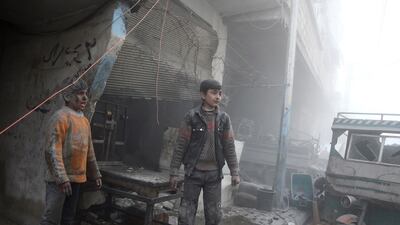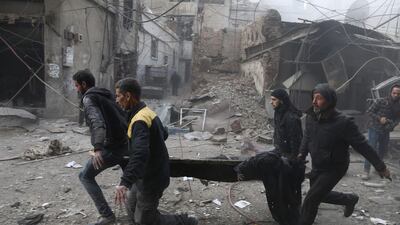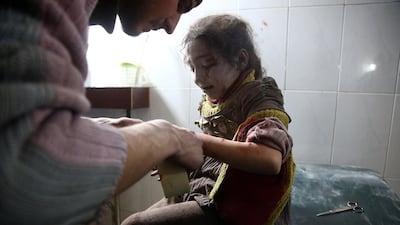Fresh air strikes hit the Syrian rebel enclave of Eastern Ghouta on Friday, the fifth straight day of a bombing campaign that has killed more than 220 civilians.
Syrian warplanes have battered the enclave's towns since Monday, trapping thousands of families in makeshift bomb shelters and overwhelming rescue workers.
World powers failed to back an appeal by UN officials for a month-long ceasefire to allow for desperately needed aid deliveries and medical evacuations.
Bombing raids resumed on several Eastern Ghouta towns on Friday morning after a few hours of calm.
Residents had taken advantage of the lull to begin clearing rubble from their doorsteps and sweep away broken glass.
In Douma, some civilians were seen scouring for salvageable items, while others rushed to the market to find food and other supplies.
But around mid-morning, an announcement blasted over mosque minarets warned of incoming strikes: "Surveillance plane in the sky. Clear the streets."
Soon after, twin strikes hit the town of Erbin, where two dozen people were killed on Thursday.
Medics in the town reported being overwhelmed by the relentless bombardment.
"From 2011 until now, there has never been the level of bombardment we've seen in the last 96 hours," said Hamza, one of doctors treating the wounded.
The Syrian Observatory for Human Rights said at least 75 people died on Thursday, three of wounds suffered the previous day.
That brought the civilian death toll since Monday to nearly 230.
_______________
Read more:
Syrian civilian deaths: 'As awful now as it's ever been'
Tillerson heads to Mideast amid new Syria carnage
US says Syria strikes killed 100 government forces
_______________
Eastern Ghouta is home to an estimated 400,000 people who have lived under crippling government siege since 2013.
More than 4,000 families live in basements and bunkers for fear of air strikes, according to Save the Children.
"The siege means there is nowhere for them to escape. There must be an immediate halt to the fighting and an end to the siege," said Save the Children's Syria response director, Sonia Khush.
Care International said the intensity of the air strikes had made it extremely difficult for relief workers to assist the needy.
"Our partners are having a hard time moving around, so how can they reach vulnerable people?" the group's communications director for Syria, Joelle Bassoul, asked.
"If there is no ceasefire, if this is all left unheard, we cannot imagine the scale of the humanitarian disaster," she said.
Eastern Ghouta is supposed to be one of four "de-escalation zones" declared last year in a bid to reduce the bloodshed.
UN aid officials appealed for a month-long humanitarian truce to allow aid to be delivered and the sick and wounded brought out for treatment.
But on Thursday the Security Council failed to support the proposal.
Washington backed it but Damascus's ally Moscow dismissed it as "not realistic".
The two governments also crossed swords over US-led air strikes that hit forces allied to the Damascus regime in eastern Syria late on Wednesday and early Thursday.
US Defence Secretary Jim Mattis said the coalition acted in self-defence after pro-Damascus forces moved on an area under the control of the US-backed Syrian Democratic Forces.
At least 100 pro-regime fighters were killed, a US military official said.
The Syrian foreign ministry condemned the bombardment as a "war crime", an accusation echoed by the Russian ambassador to the UN.
"To confront those who really fight international terrorism on the ground in Syria is criminal," Vassily Nebenzia said.
Wounded fighters were taken to the military hospital in the government-controlled eastern city of Deir Ezzor.
A reporter saw at least six fighters lying on hospital beds in sparsely equipped wards.










